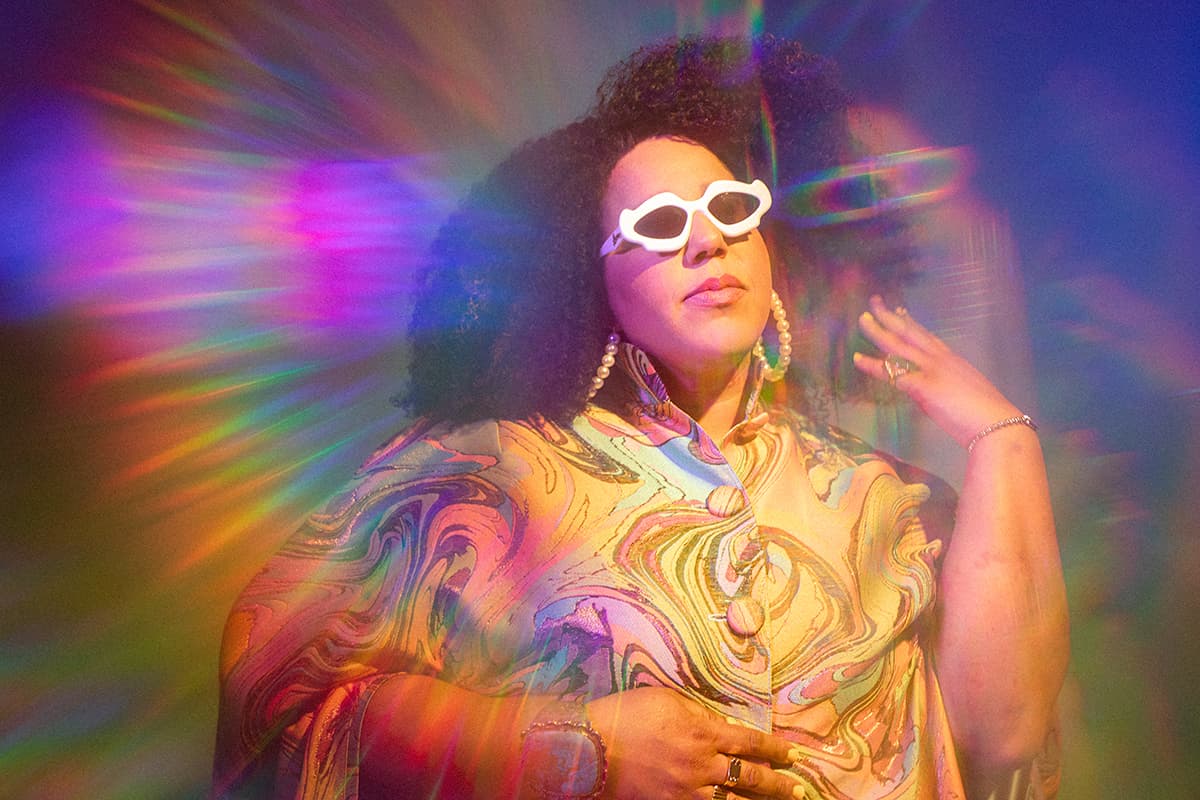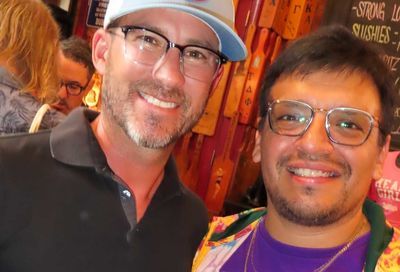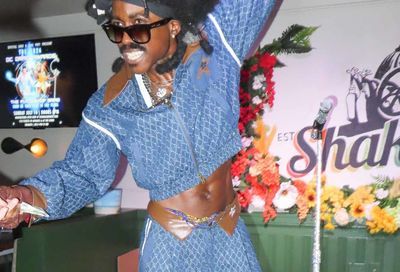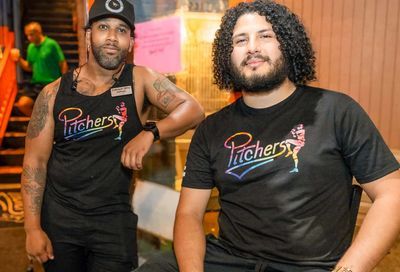Herstory
Interview with lesbian activist and historian Cheryl Ann Spector
If you’ve ever attended a gay and lesbian event in this city, chances are you’ve noticed Cheryl Ann Spector — she’s the one with the video camcorder rooted firmly in palm, chronicling each event for her own posterity.
However, what you probably don’t know about this 37-year-old lesbian is her astonishing level of community activism. Over the years she’s been involved with virtually every local gay and lesbian organization (and then some) — from OUT!, ACT UP, And Queer Nation, to ”fringe” groups such as Samazons and Drags United. Along with friends Michael Singerman and Jarmila Dokladalova, she founded EQUAL. And just recently she delighted a rapt crowd at pal Jeffrey Pendleton’s Walk Without Fear with the candid comment: ”Some people call me an activist at large, but I prefer to think of myself as a large activist.”
Large-hearted is more like it. Just listen to Spector’s sweet, warm, voice of a woman who cares — cares about her friends, cares about our people, cares about our movement. Who better to record our lives than this ”unofficial” herstorian?
METRO WEEKLY: At every event — and certainly at Drag Freak Bingo, every week — you are there, camera in hand, recording. You’re omnipresent.
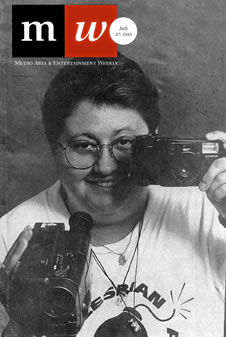 Cheryl Ann Spector |
CHERYL ANN SPECTOR: Candace Shultis, the pastor at MCC Church of Washington, also can’t figure out how I’m everywhere. She came up with an expression for me: ”bilocating.” And Larry Uhrig, the former pastor there, also said he couldn’t figure out how I could be two places at once. He was sure I had a twin.
MW: How do you do it?
SPECTOR: [Laughs.] I go through a lot of traffic lights.
MW: How did the picture-taking start?
SPECTOR: I’ve always loved taking pictures with just a regular camera — at protests, parties, events. There’s no one who doesn’t like looking at a picture and having the memory. And there’s nothing better than giving someone a picture of an event important to them.
MW: Recently you’ve gotten into videotaping everything as well.
SPECTOR: I bought the camcorder for the 1993 March on Washington, because I wanted to have my own keepsake. But I didn’t really do well with battery power, so I ultimately didn’t get much at the march. But that started me on the path to chronicle the things in my life, things I’d been to, things important to me.
MW: You must have volumes of tapes by this point.
SPECTOR: Come to the condo and you’ll see them all stacked up on the dining room table, which my lover Julie and I used to use. I’m just a pack rat. Everyone knows I’m a pack rat. Look at my car, look at my apartment. When I go to events, I pick up papers, and Julie says, ”Oh, is that more pack ratting stuff?” When we get a house, the basement is mine for flyers — I’ve got fliers from gay and lesbian events dating back to 1984. I have every Blade. That apartment is a mess, but there’s a lot of history in there. And the photos I have. I have got some photos that you wouldn’t believe. They’re in boxes — boxes and boxes and boxes of photos.
MW: You could open your own museum: The Cheryl Ann Spector Queer Collection. Have you ever organized it all?
SPECTOR: [Laughs.] I’ve thought about it. Full time job. Maybe it’s compulsiveness, but I just wanted to have the stuff, for no other reason than to say I was there, this is what happened, and years from now, when I’m not here, hopefully that stuff will be at the lesbian and gay archives, and some 16-year-old gay person will pop in a tape and see Beate, Bianca, and Babette and laugh. It’s good to have that history. I cannot tell you how many people I have on video that are no longer alive. So, it’s a tribute to them.
MW: You’re at Drag Freak Bingo videotaping every Wednesday without fail. It’s as though you’re addicted to it.
SPECTOR: Addicted, yes, but in a good way because I’ve been so depressed the last year or so. It was a very hard winter, very hard spring. It seems my whole generation’s dying. But the Bingo girls make me laugh. I get home at night at Bingo, and I’m in a good mood. It’s definitely a port in a storm.
The reason I started videotaping drag events in general is because I wished I’d had a camera in 1983 to videotape Donna Summer, Gwen Alexander, Susan St. James. These were all fabulous drag queens who had died of AIDS. And I regret not having even a picture of Gwen or Donna — two people who were very significant in my coming out. A lot of our community would want them forgotten, because they don’t fit into the agenda, but I’m not about to let that happen. I don’t want them forgotten.
MW: Let’s talk about your activism. The list is extraordinary: OUT! ACT UP, EQUAL, Queer Nation, Lesbian Avengers, and so on I don’t think I’ve ever met anybody that’s worked with so many groups. What got you so deeply involved?
SPECTOR: My activism is a result of my brother, Stan, dying in 1985. He was 34, just about to be a doctor. They graduated him in memoriam. He had AIDS, and killed himself. Jumped out of a window of a building in New York City. I was very sad, very depressed. Obviously, he was my gay buddy in the family. When he died, part of me died, too. You know, you always have hope, but after something like that happens, you don’t have hope. The hardest thing was going to his apartment a few days later and seeing that the NYC police had trashed it. And walking in and seeing his whole life scattered on the floor and then seeing the card I sent him, saying, ”Hang In There” having gotten there one day late. It was enough to rip my heart out.
After he died, I started thinking, ”Life is too short, you have to be involved, you have to do things, you have to make a difference in life.”
MW: Which of the organizations have you been most involved with?
SPECTOR: I was one of the founding members of [the local chapter of] OUT!, which stood for Oppression Under Target. It was formed out of the 1987 DC host committee of the March On Washington. ACT UP came about a year after that. At the time, I remember thinking to myself, ”Another group dealing with AIDS. Is there going to be a conflict?” Then I realized, ”No! Join ACT UP. There can’t be enough groups dealing with the AIDS epidemic.” Soon after that, Michael Petrelis, Margaret Cantrell, Robert Huff, and Stephen Smith started what we now know as Queer Nation. I remember resisting — ”No, I can’t do Queer Nation, too. That would be just too much.” But then I started seeing the stuff they were doing, so I gave it a shot. The years I was with OUT!, ACT UP and Queer Nation were some of the most exciting years of my life in terms of creativity in activism, and plain out fun. Activism was thriving. We were in the streets all the time. And we were doing good stuff, too. For instance, ACT UP took over the FDA in Rockville, and boom! — all of a sudden AZT and other drugs are being approved faster. We were making a difference.
MW: Activism has dwindled in the past few years. What’s happened?
SPECTOR: It’s certainly not the way it was. Bill Clinton was elected and people got complacent — including myself — thinking that things under him would be a lot different than they were under George Bush or Ronald Reagan. We thought it would be a breeze — he’s a democrat, he’s going to lift the ban on gays in the military….
And I remember Michael Petrelis, the night Clinton won, standing outside the ballroom at the Omni Shoreham, handing out flyers reading ”Impeach Clinton.” I remember saying to Michael, ”Oh, come one, he won, he’s gonna be great!” And Michael said, ”No, he’s not. You watch.” I have already told Michael he was right.
MW: Michael, it seems, has given up the fight.
SPECTOR: Well, he’s sad. There just comes a point…. I mean, Michael’s saying the same thing about the 1996 elections at the primaries that he said about the 1992 elections. We had a long conversation after our friend Robert Huff died last February. We were crying and Michael said, ”Why am I doing this?” And I said, ”Because Robert would want you to.” And he said, ”No. Robert would probably want me on a beach drinking a margarita.”
People are tired. I think some of us older, experienced activists are tired. People have moved, people have grown up, people have careers — they don’t have the time they used to. Life has gotten busy. A lot of us have become caretakers. I spend many hours worrying about my friends who are sick and wondering when the phone is gonna ring with bad news.
But we need to still hold the government accountable. Maybe Newt Gingrich’s rise to power will rile people up. I would love it if Queer Nation would come back in a powerful way. I’d participate. But I don’t have the energy to be the one to bring it back.
MW: Which organizations are making a difference these days?
SPECTOR: Groups like SMYAL — any of the youth groups. Groups like Food and Friends, PFLAG is also crucial to the future of our movement — in fact, maybe single-handedly crucial. It’s important because parents and friends relate on a different level to one another. We can’t win an election on our own. But if you take all of our siblings who support us, all of our parents, our aunts, uncles, nieces, nephews, and cousins that support us, colleagues at work that support us, and put all that together — well, that’s a significant block of people.
Another organization that’s very important is the D.C. Coalition of Black Lesbians, Gay Men, and Bisexuals. Too many activist meetings in this city are just too white. And this is not a white city. Why are there such white meetings? The diversity isn’t there. When the D.C. Coalition started, it made me happy that there was finally a group to break down our walls.
MW: You were born Jewish….
SPECTOR: Yes. Jewish parents, Jewish family. I’m a member of Bet Mishpachah. But I’m also a member of the Metropolitan Community Church of Washington.
MW: How did that come about?
SPECTOR: It was an interesting journey. I wasn’t raised religiously Jewish, I was raised culturally Jewish. Didn’t really know a lot about the religious part of Judaism. I tried to learn, but I didn’t really feel the spiritual pull.
The year after the 1987 March, I went to a performance of the Lesbian and Gay Chorus at Bet Mishpachah. So I said, there’s gay and lesbian Jews, great! I joined, but I still never felt the spiritual pull. Then a friend of mine took me to MCC, because she wanted to go. I walked in and felt very oogy — didn’t like the feeling. I said, ”I’m Jewish. I’m not supposed to be here.” But I went back for a number of reasons — partly because there was a cute woman there who I liked and partly because they were going to start preaching a series on the ten commandments. So I returned and ended up learning a lot about Judaism in the church. Something inside me said, ”This is where your spiritual base is going to be.” I wound up joining and getting baptized.
Together, the two together keep me very rounded. I’m actually feeling more spiritually Jewish now. And it’s very convenient because the Christian stuff I don’t like, I get rid of, and the Jewish stuff I don’t like, I get rid of. I’ve made my own spirituality.
MW: Do you believe in Jesus?
SPECTOR: It’s a hard rationalization, because Jews are supposed to stop before the New Testament. But Jesus was Jewish. And as a mortal, he was revolutionary then as gay and lesbian activists are now. He was putting forth ideas that were very important. But I don’t know how much I believe in the resurrection. I do, however, believe he was a son of God. You’re a son of God. I’m a daughter of God. He was a son of God.
MW: How did your parents take it?
SPECTOR: Not well in the beginning. But my mom, when she walked in and saw the bumper sticker in my apartment reading ”My boss is a Jewish carpenter,” threw her arms up and said, ”If you’re happy, I’m happy. What next?”
MW: One last thing: You take your shirt off everywhere. This is the other thing you seem to be known for.
SPECTOR: I think, if men are allowed to take their shirts off, women should be, too. The problem is that you need to pick your places carefully. Because a man taking his shirt off is not going to be molested, raped, or bashed in that way, but I might be. I take my life in my hands if I do it in certain places. That’s why I pick places that are safe.
MW: Such as those filled with gay men.
SPECTOR: Or lesbians. Mostly men, though. I mean, at the Dyke March, I took my shirt off. I have a picture of me crushing a beer can — I got famous for that for a while. I’m not doing it as much lately because it hurts a little more now. It gets sore.
MW: So, I guess we could consider your breasts lethal weapons.
SPECTOR: [Laughs.] They could smother people.
Support Metro Weekly’s Journalism
These are challenging times for news organizations. And yet it’s crucial we stay active and provide vital resources and information to both our local readers and the world. So won’t you please take a moment and consider supporting Metro Weekly with a membership? For as little as $5 a month, you can help ensure Metro Weekly magazine and MetroWeekly.com remain free, viable resources as we provide the best, most diverse, culturally-resonant LGBTQ coverage in both the D.C. region and around the world. Memberships come with exclusive perks and discounts, your own personal digital delivery of each week’s magazine (and an archive), access to our Member's Lounge when it launches this fall, and exclusive members-only items like Metro Weekly Membership Mugs and Tote Bags! Check out all our membership levels here and please join us today!




